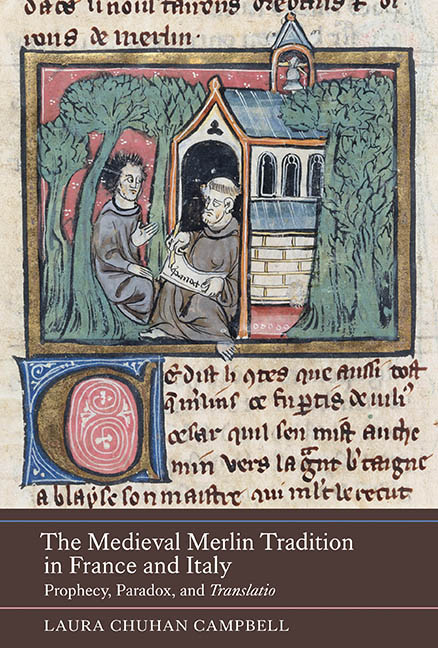Book contents
- Frontmatter
- Contents
- Miscellaneous Frontmatter
- Acknowledgements
- List of Abbreviations
- Introduction
- 1 Sympathy for a Devil? Merlin's Conception according to Robert de Boron and Paulino Pieri
- 2 Death of the Author: Merlin's Imprisonment by the Dame du Lac
- 3 Beyond the Limits of Interpretation: Rewriting Prophetic Discourse in the Estoire de Merlin and the Suite du Merlin
- 4 ‘Ce dit Merlin’: Open and Closed Prophecies in the Italian Merlin Tradition
- Conclusion
- Appendix 1 Chronology of Primary Texts
- Appendix 2 Summaries of the Principal Texts Discussed
- Bibliography
- Index
- Miscellaneous Endmatter
4 - ‘Ce dit Merlin’: Open and Closed Prophecies in the Italian Merlin Tradition
Published online by Cambridge University Press: 23 August 2019
- Frontmatter
- Contents
- Miscellaneous Frontmatter
- Acknowledgements
- List of Abbreviations
- Introduction
- 1 Sympathy for a Devil? Merlin's Conception according to Robert de Boron and Paulino Pieri
- 2 Death of the Author: Merlin's Imprisonment by the Dame du Lac
- 3 Beyond the Limits of Interpretation: Rewriting Prophetic Discourse in the Estoire de Merlin and the Suite du Merlin
- 4 ‘Ce dit Merlin’: Open and Closed Prophecies in the Italian Merlin Tradition
- Conclusion
- Appendix 1 Chronology of Primary Texts
- Appendix 2 Summaries of the Principal Texts Discussed
- Bibliography
- Index
- Miscellaneous Endmatter
Summary
The previous chapter has argued that Merlin's prophetic words challenge the logic of the narrative, and, more specifically, that the very challenges they pose encapsulate the same semiotic difficulties of translation between incompatible systems of expression. The incomprehensibility of Merlin's prophecies, which is manifested in fragmented symbols or a fragmented delivery, characterises the translatio between supernatural and human thought. Such knowledge cannot be transmitted in full; just as a translator of an ambiguous word often has to prioritise one meaning and omit another, the totality of Merlin's knowledge can only be conveyed partially, ‘through a glass, darkly’. This chapter will continue the discussion of prophecy from the perspective of translation, but it will turn instead to the mouvance of Merlin's political prophecies between versions of the Venetian Prophecies de Merlin written in Franco-Italian, French, and Italian dialects. In his Italian incarnation, Merlin still speaks in obscures paroles, but his words have a different function; rather than pointing forward to a later episode in the narrative, they instead refer back to recent events from Italian history, and forward to the Apocalypse. This extension of prophetic discourse beyond the confines of the narrative has further implications for translation; that is, not simply the translation between the different dialects, but between literal and figurative levels of expression. As this chapter will demonstrate, the use of prophetic symbolism has the dual effect of obscuring the political message of the prophecy, yet at the same time relying on the general knowledge of a certain type of reader to point explicitly to the people, places, or events that are signified. The semiotic challenge of translation is, here, simultaneously linguistic, temporal, and spatial. Because these people, places, and events are never articulated literally in the text, their identification depends on the context of reception – a context that changes as the text is transmitted to different places and periods. Yet, as I aim to demonstrate, the time- and location-specific reception does not become redundant as it moves away from the text's original context of thirteenth-century Venice. Because the Prophecies de Merlin is an ‘open text’, defined by Umberto Eco as a text that demands reader participation in the creation of its meaning, the unarticulated referents become open to resignification.
- Type
- Chapter
- Information
- The Medieval Merlin Tradition in France and ItalyProphecy, Paradox, and Translatio, pp. 141 - 174Publisher: Boydell & BrewerPrint publication year: 2017

